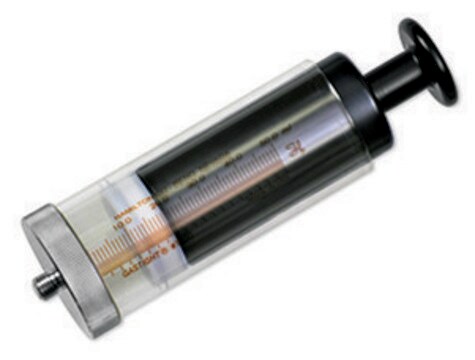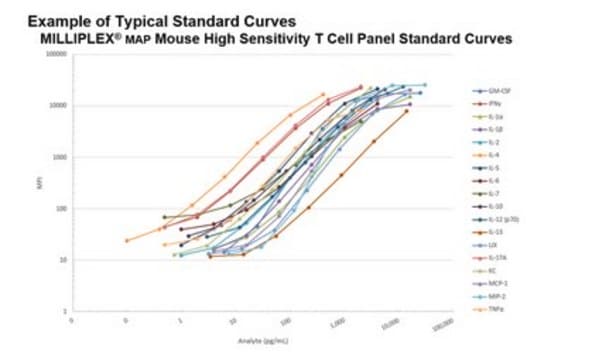RLI1MAG-92K
MILLIPLEX® Rat Liver Injury Panel - Toxicity Multiplex Assay
Synonym(s):
Luminex® Rat Liver Toxicity Assay, Millipore Rat Liver Toxicity Assay, Rat Liver Injury Multiplex Panel
About This Item
Recommended Products
description
The analytes available for this multiplex kit are: Liver-type arginase 1 (ARG1), aspartate transaminase 1 (GOT1), α-glutathianone S-transferase (GSTα), sorbitol dehydrogenase (SDH), and 5′-Nucleotidase (5′-NT/CD73).
Quality Level
species reactivity
rat
manufacturer/tradename
Milliplex®
assay range
accuracy: 77-92%
sensitivity: 0.021-4.038 ng/mL
(MinDC+2SD)
standard curve range: 0.02-15.0 ng/mL
(GSTα)
standard curve range: 0.04-30.0 ng/mL
(5′-NT/CD73)
standard curve range: 0.08-60.0 ng/mL
(GOT1)
standard curve range: 0.10-75.0 ng/mL
(ARG1)
standard curve range: 0.62-450.0 ng/mL
(SDH)
technique(s)
multiplexing: suitable
detection method
fluorometric (Luminex xMAP)
shipped in
wet ice
General description
*ARG1, GSTα, and SDH are biomarkers listed in the Predictive Safety Testing Consortium (PSTC) project pipeline which have a strong translational role in drug safety testing.
The MILLIPLEX® portfolio provides a valuable research assay to investigate multiple biomarkers of liver injury in rat serum and plasma samples using the Luminex® xMAP® instrument platform. This kit uses a 96-well format, contains a lyophilized standard cocktail, two quality controls and can measure up to 38 serum or plasma samples in duplicate.
Drug toxicity is the leading cause of acute liver failure in the United States. Patients with liver damage generally display elevated amounts of specific liver proteins in serum; these proteins can serve as biomarkers of drug-related liver toxicity. Monitoring these biomarkers can greatly help clinicians avoid drug-induced liver failure. Performing laboratory tests to characterize the side effects of potential therapeutics is an essential part of drug development. The rat is a leading animal model for these pre-clinical toxicity studies. The search for sensitive, organ-specific toxicity biomarkers is complemented by the development of novel assays to measure these critical analytes. Liver-Type Arginase 1 (ARG1), α-glutathione S-transferase (GSTα), and Sorbitol Dehydrogenase (SDH) are biomarkers listed in the Predictive Safety Testing Consortium (PSTC) project pipeline which have a strong translational role in drug safety testing. Aspartate transaminase 1 (GOT1) and 5′-Nucleotidase / CD73 (5′-NT) are traditional biomarkers recognized by both the Food and Drug Administration (FDA) and its European counterpart, the European Medicines Agency (EMA).
Panel Type: Toxicity
Application
- Analytes: 5′-Nucleotidase (5′-NT/CD73), Liver-Type Arginase 1 (ARG1), Aspartate transaminase 1 (GOT1), α-Glutathione S-Transferase (GSTα), Sorbitol Dehydrogenase (SDH)
- Recommended Sample Type: Rat serum and plasma
- Recommended Sample Dilution: 25 μL per well of 1:25 diluted serum or plasma
- Assay Run Time: 2 hours at room temperature (20-25°C)
- Research Category: Toxicity
Features and Benefits
Components
Rat Liver Injury Quality Control 1, 1 vial, lyophilized
Rat Liver Injury Quality Control 2, 1 vial, lyophilized
Assay Buffer, 1 bottle, 30 mL
Wash Buffer, 10X (0.05% Proclin), 2 bottles, 30 mL ea
Rat Liver Injury Detection Antibodies, 1 bottle, 3.2 mL
Streptavidin-Phycoerythrin, 1 bottle, 3.2 mL
Mixing Bottle, 1 bottle
Sample Plate, 96 well format, 1 plate
2 Foil Plate Sealers
Other Notes
Legal Information
Signal Word
Danger
Hazard Statements
Precautionary Statements
Hazard Classifications
Acute Tox. 3 Dermal - Acute Tox. 4 Inhalation - Acute Tox. 4 Oral - Aquatic Chronic 2 - Eye Irrit. 2 - Skin Sens. 1
Storage Class Code
6.1C - Combustible acute toxic Cat.3 / toxic compounds or compounds which causing chronic effects
Certificates of Analysis (COA)
Search for Certificates of Analysis (COA) by entering the products Lot/Batch Number. Lot and Batch Numbers can be found on a product’s label following the words ‘Lot’ or ‘Batch’.
Already Own This Product?
Find documentation for the products that you have recently purchased in the Document Library.
Our team of scientists has experience in all areas of research including Life Science, Material Science, Chemical Synthesis, Chromatography, Analytical and many others.
Contact Technical Service








